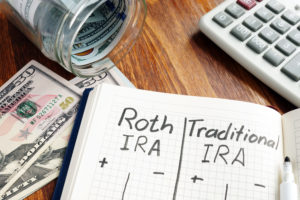
What’s the big appeal of Roth IRAs? Simple. Unlike traditional IRA accounts, Roths don’t have required minimum distributions, and the money can grow tax-free over the rest of the owner’s lifetime. Joe Elsasser, CFP® of Covisum explains. The SECURE Act legislation opened up new opportunities for both estate and retirement planning based around IRA “conversions”. SECURE made three major changes to the rules governing IRA accounts:
- Required Minimum Distributions (which had begun at age 70 ½, now begin at 72.
- People who are employed may contribute to IRAs (there is no longer an age cap).
- There are no more “stretch IRAs”, in that heirs (other than spouses) must withdraw – and pay tax on – all the money in an inherited IRA within ten years.
When either all or part of a traditional IRA is converted to a Roth, income tax is due on every dollar being moved. For this reason, it makes the most sense to consider converting only that amount which would not result in the client moving into the next highest tax bracket. For example, a couple (filing jointly) with 2021 income of $120,000 would pay 24% tax if they converted less than $43,000 of their IRA assets to Roth; converting more than that would push them into the 32% tax bracket.
A second Roth conversion pitfall to avoid has to do with Medicare expenses. To the extent a Roth conversion increases taxable income, there could be an increase in Medicare charges (which are based on modified adjusted gross income). Social Security taxes themselves might be affected by an increase in taxable income.
Sounds as if negatives outweigh the positives? Hardly. In fact, as Covisum reminds readers, “one tax technique that can be especially beneficial to many affluent retirees is the Roth conversion. Converting part of a traditional IRA into a Roth IRA can have significant long-term tax benefits.”
From a pure estate planning standpoint, Bill Bischoff of MarketWatch says seniors who convert a regular IRA into a Roth account can accomplish three very desirable results:
- eliminate the need to take withdrawals out of the account
- reduce estate taxes
- reduce the income tax their heirs would need to pay on withdrawals from an inherited regular IRA
If you convert your traditional IRA to a Roth, what happens after you die? If your Roth has been open for more than five years, withdrawals by your heirs will be federal income tax free. Money remaining in the account will continue to earn tax-free income.
While at Geyer Law, our attorneys offer no direct tax advice, instead working in coordination with tax advisors to combine estate planning and tax planning strategy, we remind clients that Roth conversion is an important consideration.
Getting it just right is important on Roth IRA conversions!
– by Cara Chittenden, Associate Attorney at Rebecca W. Geyer & Associates

